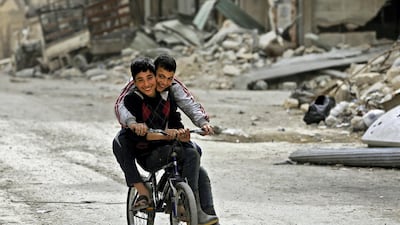There is no mistaking the key theme of Khaled Khalifa's acclaimed novel. Like the grey clouds and dust from the rubble of the buildings of Aleppo in which his recently translated 2013 novel No Knives in the Kitchens of This City is set, what hovers over most of the sprawling cast of characters is a foreboding sense of shame.
It is wrapped in the anguish of lost hopes and dreams, and the overall grief of witnessing a once proud city losing its lustre.
But while it is easy to associate those feelings with what is happening in Syria now, the plot draws a longer bow: it begins during the First World War and moves forward at a brooding pace towards the 1963 Baathist coup led by Hafez Al Assad, father of current leader Bashar, and the early 2000s towards the end of his rule.
Through it all, our detached narrator takes us into the multigenerational lives of a family consisting of a musician, a teacher and a villager, and how tightening repression has dulled their judgment and sense of morality. For example, one of the heartbreaking stories within the plot is the fraught relationship between the mother, Suad, and her disabled daughter, which teeters on the edge of outright cruelty, the repercussions of which ultimately destroy Suad's life.
Khalifa, who was born in Aleppo and appears in Dubai this weekend as part of the Emirates Airline Festival of Literature, says such dynamics don't happen in a vacuum.
“That’s the thing with shame,” the 53-year-old says.
“That is a feeling that plenty of us Syrians identify with because of the years of withstanding the violence and repression. Whole generations went through that silently, and when I speak to people, there is a sense of shame for experiencing such a situation. But it is important to note that this is not based on what is happening in Syria now, which is also a tragic situation.”
Staying in Syria
Considering his international stature – No Knives in the Kitchens of This City won the prestigious Naguib Mahfouz Medal for Literature in 2013 and was shortlisted for the 2014 International Prize for Arabic Fiction, while his 2008 novel In Praise of Hatred was translated into several languages – it is surprising to find that Khalifa resides in Damascus. While offered invitations to live abroad, he is adamant about living in Syria, where he also has a successful career as a television dramatist.
“This is really down to a personal choice to be honest and I am not trying to say or prove anything,” he says. “I have my friends and colleagues here. While there has been no fighting here, it doesn’t mean that we don’t know there is a conflict that is going on. We are careful here in all that we do.”
The distance from the wreckage of Aleppo, about 370 kilometres from the Syrian capital, proved beneficial in the writing process.
“You are away, but not too far,” he says. “You are still in the same country and you generally share the same culture. But writing the novel here gave me a wider vantage point on the city and allowed me to pick up on certain things that I perhaps may have not if I was living over there.”
For one thing, he says, it uncorked great reserves of memory he rarely accessed from his childhood and university years.
“They were thousands of pictures that kept appearing within me. Images of myself, the city and the social life, and one of the things that came out was this notion of repressed pain,” he says.
“These feelings welled up inside me, like injustice or grief, and they all told me that I should write about them. These are all good things for a novelist, of course.”
Hopeful for Aleppo
For all the novel’s bleak perspective, however, Khalifa is optimistic about Aleppo’s future.
“You need to understand Aleppo’s past,” he says.
“This is a city that went through many periods of turmoil over hundreds of years, from earthquakes to invasions. There is a resilience in the city, and that causes me a great deal of optimism.”
Khalifa predicts that the present dark period will act as an incubator for a new generation of Syrian authors whose experience will mark a decisive break from the past when it comes to their output.
____________________
Read more:
Emirates Airline Festival of Literature announces full line-up
International Prize for Arabic Fiction: The six finalists shortlisted for the 'Arabic Booker'
The books, music and luxuries that author Alexander McCall Smith can't live without
____________________
“I am positive that we will be entering a new phase of Arabic novels soon,” he says.
“They will come with new and innovative ideas when it comes to stories and techniques. I view that as a normal occurrence. What is happening now in Syria and parts of the Arab world is a big earthquake, but from that wreckage new life will grow.
“Many countries that experienced such situations had the nature of their arts and culture change. This is why I think the future will be bright and there will be better writers coming.”
Khaled Khalifa appears at the Emirates Airline Festival of Literature in the session Aleppo in Our Heart on March 2 at 7.30pm. He will also take part in the Contemporary Arabic Literature in the West session on March 3 at 7.30pm. All events are held at the InterContinental Dubai Festival City. For more information, visit www.emirateslitfest.com


